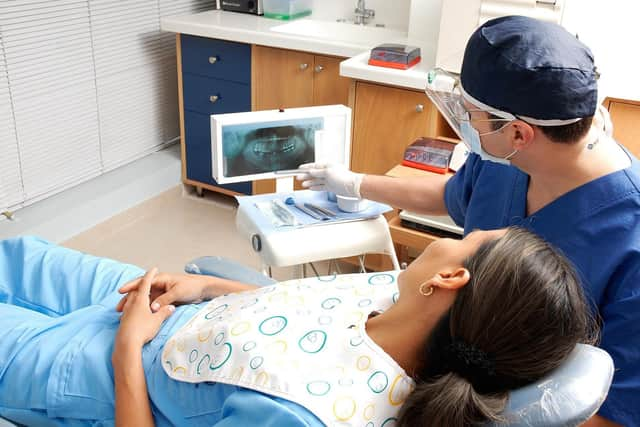Dentists facing ‘massive hike’ in costs to deliver NHS services in Northern Ireland
and live on Freeview channel 276
With practices facing a massive hike in costs to deliver Health Service dentistry following COVID, dentists are worried about the future of NHS dentistry and the patients who depend on this service.
They say without additional support being made available, in parallel with work on a new contract, Health Service dentistry will simply not be financially viable.
Advertisement
Hide AdAdvertisement
Hide AdThe unions stress a fundamental redesign of the low margin/high volume contract model NHS high street dentists work to is now “an absolute necessity”.


It says fees provided for care – for individual items from crowns to dentures – have fallen by as much as a quarter in real terms in the last decade. With these fees often failing to match costs incurred the BDA warn dentists are growing increasingly reliant on private revenue to prop up NHS side of their practices.
Dental earnings, the body said, have reduced by 40% in real terms since 2008, with committed HS dentists providing care to those who need it most now earning the least and morale among the profession at an ‘historic low’.
Half of all dentists are now stating their intention to move towards more private work, while over two-thirds of Health Service dental practices reported at least one unfilled dentist vacancy last year, with every vacancy translating into thousands of patients unable to access care. 40% of practices say reluctance to work in NHS dentistry is the key difficulty to recruiting.
Advertisement
Hide AdAdvertisement
Hide AdThe union is calling on all parties to set out a concrete plan to shore up firm foundations for Health Service dentistry and stem the flow of talent away from Health Service dentistry. It calls for the restoration of a scheme – axed in 2016 – that recognised and rewarded commitment to the NHS.
It has also stressed the need for sweeping action to tackle rampant oral health inequalities in NI. Northern Ireland is at the bottom of the UK league table for oral disease, and COVID means this inequality is set to widen. NI residents are twice as likely to have filled teeth as counterparts in England, and children are three times as likely to have multiple teeth extracted under General Anaesthetic. The gap in attendance between the most and least deprived communities widened during the pandemic.
The BDA has pointed to Welsh and Scottish programmes – that have been exported worldwide from Chile to Israel - with activities such as supervised tooth-brushing in nurseries that would pay for themselves through reduced treatment need.
Dentist leaders have called for ring-fencing of proceeds from the Sugar Levy to fund pioneering efforts, alongside commitments to a feasibility study into water fluoridation. While all four UK Chief Medical Officers recently issued a joint statement underlining the benefits of water fluoridation – which can save £20 for every £1 spent – there is no indication NI will follow the lead of England that is moving to embrace the schemes at scale.
Advertisement
Hide AdAdvertisement
Hide AdRoz McMullan, Chair of the British Dental Association’s Northern Ireland Council said: “Short-term financial support saved Health Service dentistry from collapse during the pandemic, but the next Assembly must deliver real change if we’re going to avert a crisis.
“Northern Ireland’s dentists are working to a financial model that no longer adds up. Overstretched and underfunded, Health Service committed practices are struggling to remain financially viable.
“Colleagues feel they are being pushed out of HS dentistry – at the very time we face a huge COVID backlog. We all need to know this service has a future, because otherwise the UK’s deepest oral health inequalities will only widen.
“We need an ambitious Oral Health Strategy. Our children are three times as likely to face tooth extractions as those in England. There’s nothing inevitable about this, and a 21st century plan can secure huge savings by investing in prevention, not just cure.
Advertisement
Hide AdAdvertisement
Hide Ad“It is incumbent that the next Assembly prioritises the rebuild and reform of dentistry in NI. We are ready to work with every party and every candidate to secure a better future for patients and practitioners alike.”